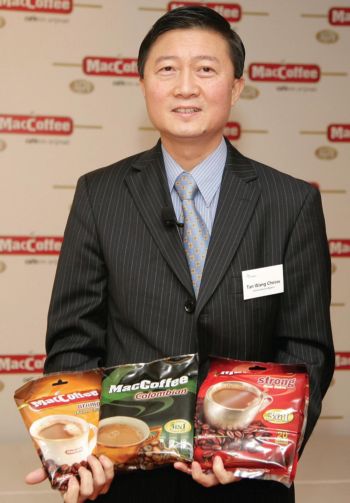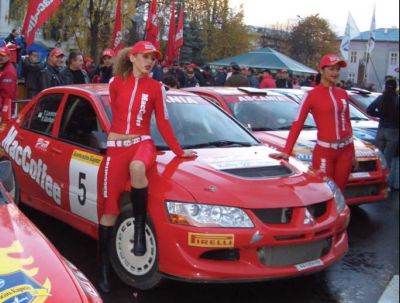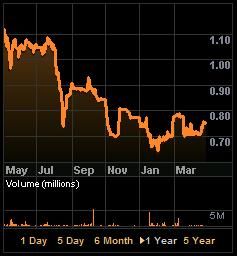
Singapore has always taken a concerted effort in promoting itself, with the Formula 1 and Youth Olympic Games being the latest in line to display “Brand Singapore” on the international stage.
Just as the country has made tremendous inroads in its branding efforts, homegrown Food Empire Holdings has also been steadily enjoying similar success in cementing its presence overseas, especially in Eastern Europe and the Middle East.
While unknown to most Singaporeans,the company’s MacCoffee brand of coffee mix is a household name in countries such as Russia, Ukraine and Kazakhstan where it remains the outright market leader, according to a recent ACNielsen report.
“The funny part is when we asked them in a consumer survey where this brand comes from, many think it’s a Russian brand even though we do state on our packaging that this is a product of Singapore,” relates Mr Tan Wang Cheow, chairman and managing director of Food Empire Holdings.
Well-entrenched is MacCoffee in the Russian coffee scene that it comes as little surprise that the country accounted for 55 per cent of the Group’s record-high revenue of $277 million for the year ended 31 December, 2007 – an 18.3 per cent increase from the previous year.
And the company credibly sidestepped the issue of rising raw material cost to register a 17.7 per cent improvement in net profit for 2007 to $31.6 million.

Branding strategy
Much of the Group’s success is the result of targeted and sustained promotional efforts especially for its flagship MacCoffee brand. Having penetrated the lucrative Russian market in 1994, MacCoffee is now the country’s market leader for 3-in1 coffee - increasing its market share to 46 per cent as of 2007.
When added on to the Petroskaya Sloboda brand which the company acquired last year for US$8.7 million ($12.1 million), Food Empire dominates 55 per cent of the instant coffee market in Russia.
To ensure an effective branding exercise, the company places particular emphasis on consumer research to better understand its customer base. “We try and find out our consumers’ characteristics and why they are buying our brand, so all these help us to work on advertising activities to target and relate to these consumers,” explains Mr Tan.
Recent activities include re-designing the MacCoffee 3-in-1 logo to create a fresh new image. Mr Tan revealed that the Group spent about $500,000 in designing its new packaging, which bears testimony to the importance that it attaches to brand building. MacCoffee’s television commercials are a particular hit and its advertisement in Ukraine with the slogan: “Every second Ukrainian is a MacCoffee drinker” clinched “TheGrand Prix” award in the Kiev Advertising Festival in Ukraine last year.
“I think many Asian companies are particularly reluctant to part with their money to go for brand because it’s a little bit too intangible…but ultimately there is an emotional attachment between your brand and the customer,” says Mr Tan. Food Empire typically spends about 10 per cent of its turnover on branding and marketing activities, which involves a combination of distinctive packaging, innovative advertising, promotional offers as well as sponsorship of sporting and cultural events.
And its branding efforts have been acknowledged by International Enterprise (IE) Singapore when the Group was recognised as one of “The Most Valuable Singapore Brands” for four consecutive years from 2003 to 2006; while a recent brand evaluation study conducted by international branding consultants Brand Finance has valued its proprietary MacCoffee brand at $166 million.
Mr Tan believes that the Group’s branding strategy has been a major contributor to its seven consecutive years of double digit growth since listing in 2000, with a Compound Annual Growth Rate (CAGR) of 24.7 per cent.
Its steady growth landed the company a spot in Forbes’ “Asia’s Best under a Billion” list for 2007, which identifies the top 200 companies in Asia with consistent sales and revenue growth over a three-year period.
| Food Empire | FY2007 | FY 2006 | % change |
Revenue |
$276.9 million | $234.1 million | 18.3 |
| Net Profit | $31.6 million | $26.8 million | 17.7 |
| EPS - Fully Diluted | 7.15 cents | 6.56 cents | 11.4 |
Dealing with rising costs
In the past year, many food and beverage companies have had to deal with surging raw material cost. But Food Empire’s improved profit margins in light of rising coffee bean prices – the Arabica Average Index has increased 19 per cent year-to date – indicates that the company has managed the escalation of commodity prices well.
Mr Tan says that the Group had anticipated rising raw material cost and were able to lock in the prices of some of their supplies. It also took the step of widening their scope of suppliers and was thus less dependent on a select few. Crucially, the Group was also able to cushion pricing pressures by passing on a substantial portion of the raw material increase to its consumers with little resistance.
This was helped by rising income levels in their key Eastern European markets and MacCoffee’s entrenched position as market leader. “The inflation in emerging markets is a concern but it also provided us a good reason to raise our prices without blinking an eye. Most of the time, bringing down your price is easy but scaling it up is harder but this is the first time where you could scale up the price without people asking you further questions,” says Mr Tan.
He notes that in the last year alone, the company has revised its prices some three to four times in certain markets. “What we were worried about was whether we would still continue to dominate the market even after adjusting our prices. But the AC Nielsen report shows that we’re still dominating the market and that consumers are still with us,” points out Mr Tan while adding that sales turnover has remained unaffected.
Growth prospects
As the mainly former Soviet states of Eastern Europe and Central Asia contributed 93 per cent to Group revenue last year, the management intends to consolidate its position in these markets. With a combined population base of over 250 million consumers who are becoming increasingly affluent, these markets continue to offer tremendous growth potential.
And to leverage on the powerful branding it has developed in these markets, Mr Tan expects to introduce more products in these countries and grow the Group’s consumer base. He has identified its MacChocolate drink, which is an instant hot chocolate beverage, to have the potential of being the next star performer in its stable of products.
“We introduced hot chocolate about three years ago and in countries like Ukraine for example, our sale is about 40 containers a year but we believe it can grow to 100 containers. It is just a matter of building up more awareness amongst consumers there,” declares Mr Tan.
He also alluded to possible acquisitions as the company looks to move its production capabilities upstream. This includes businesses that produce sugar and creamers,which are needed for the production of the Group’s 3-in-1 coffee mix.
“There’s no reason why we shouldn’t incorporate some of these businesses and take them as our own as well. It will make us less dependent on too many other suppliers so we’d love to own one of these ingredient factories,” says Mr Tan.

Good value
With a price to earnings ratio of 8X for estimated earnings growth of 15 per cent in 2008, Merrill Lynch sees good value for Food Empire’s shares. “We like the management’s track record and the company’s exposure to consumers in high-growth CIS (Commonwealth of Independent States) countries. At the current price, investors are buying into the firm at a very cheap price,” Merrill Lynch analyst Chong Han Lim wrote in a recent report.
The investment bank assigned a ‘buy’ call with a target price of $1.20 for the stock. As of March 14, Food Empire’s stock closed at 78 cents which thus suggests upside potential of 54 per cent. Just as it has been making a big impression overseas, Food Empire is poised to make ripples on the Singapore front as well. 
Analyst report was provided by Thomson Financial.
This article was recently published in Smart Investor magazine and is reproduced here as part of a special collaboration between the magazine and NextInsight.






